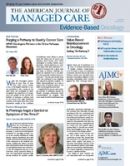- Center on Health Equity & Access
- Clinical
- Health Care Cost
- Health Care Delivery
- Insurance
- Policy
- Technology
- Value-Based Care
BRCA1/2 Genetic Testing Found Cost-Effective in Current Era
SABCS Conference Coverage
Using current treatment costs and medical guidelines, genetic testing for BRCA1/2 mutations among apparently healthy women at high risk of breast and/or ovarian cancer was deemed cost-effective in a study reported at the 2011 CTRC-AACR San Antonio Breast Cancer Symposium in Texas.
From a societal perspective, the incremental cost-effectiveness ratio (ICER) increased from $9000 per qualityadjusted life-year (QALY) in a previous study [Holland MA et al. Value Health. 2009;12(2):207-216] to $30,600 per QALY. From a private payer perspective, the ICER is $36,800 per QALY.
A family history of breast and/or ovarian cancer increases the likelihood of being a BRCA1/2 carrier, as well as the risk of developing breast and/or ovarian cancer. The 2009 study found BRCA1/2 genetic testing to be a cost-effective strategy, regardless of the probability of a mutation. Since that study was published, medical guidelines for BRCA carriers have been updated to include annual use of magnetic resonance imaging (MRI) in women found to be BRCA1/2-positive.
The present study was conducted to determine if genetic testing for BRCA mutations remained a cost-effective strategy for high-risk women, given the additional guideline to include magnetic resonance imaging (MRI) for women who are identified as carriers, as well as updates in healthcare practice, policy, and the clinical specificity of testing over the past 10 years.
A semi-Markov decision model incorporated the annual use of MRI for screening in BRCA carriers, as well as updated treatment costs for breast and ovarian cancer from 2009 to 2011. The target population was asymptomatic women in the United States aged ≥35 years who were at elevated risk of carrying a BRCA1/2 mutation. The base-case cost-utility analysis compared BRCA1/2 testing followed by possible surgery when a mutation was identified versus no BRCA1/2 testing or subsequent surgeries.
A sensitivity analysis confirmed that the model was robust to variation in the model parameters. Testing was preferred if the probability of carrying a mutation was greater than 3.1%. If the cost of genetic testing was above $8948, it would no longer be considered costeffective, but the current upper boundary of cost estimates is $4500.
“The cost of the actual genetic test is not a barrier to its cost-effectiveness,” said lead author Qinghua Li, MD, University of Rochester, New York. “Genetic testing for BRCA1/2 mutations proved to be cost-effective for unaffected women whose pre-test mutation probability was 3.1% or higher based on family history,” Li said.
From a societal perspective, the actual cost of testing versus no testing differed by $9844. From a private payer perspective, the actual cost of testing versus no testing was $11,868. These differences were used to compute ICERs and QALYs.
The study had several limitations, including sparse published data for several model parameters, such as the mortality reduction that can be attributed to MRI, the magnitude of cost reduction in earlier detection of breast cancer by MRI, and assuming 100% utilization of MRI by BRCA-positive women. “All women [who are BRCA-positive] will probably not have a breast MRI, and thismay result in overestimating the cost of genetic testing,” Li said.Funding Source: None.
Author Disclosure: The author reports no relationship or financial interest with any entity that would pose a conflict of interest with the subject matter of this article.
Authorship Information: Concept and design; drafting of the manuscript; and critical revision of the manuscript for important intellectual content.


